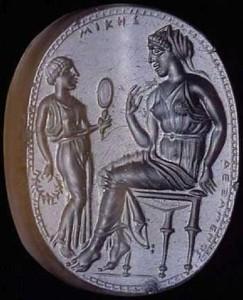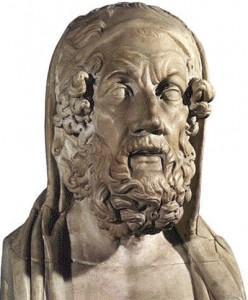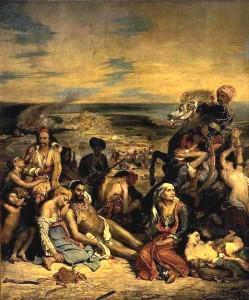Chios History
...The famous explorer, Christopher Columbus, credited with finding America, came to Chios and stayed for two years. He was supplied by the islanders with maps and valuable information as he planned his famous voyage across the Atlantic Ocean.
 The word Chios is believed to be of Syrian or Phoenician origin and means mastic or snake. According to another theory, the name derived from the nymph Chioni, daughter of the settler of Chios, Oinopion (= wine drinker), who was the son of Dionysus and the grandson of Minoa and was taught wine making (and drinking!!!) by his father. Another tradition reveals that Chios got its name from Chios, son of Poseidon.
Jason, the mythical hero of the Argonaut mission, is reported to have stopped at the island as he journeyed to far-off Phryghia. Also in mythology, King Oinipion, son of Radamanthos, brother of Minos, arrived on the island and, as he was charmed by the mild climate of it, he built a sanctuary in honor of Phanaeos Apollo and known as Phana Akrotiri.
Chios has perhaps been unique in its history for the number of major disasters its inhabitants have suffered, either through war and invasion, or through earthquakes. Inhabited from the Bronze Age, Chios was later colonized by the Ionians and was one of the 12 city states on the mainland of Asia Minor and certain neighboring islands constituting the Ionian Confederacy, also known as Panionian Dodecapolis.
In the ninth century B.C., two of the world’s greatest poems, Iliad and Odyssey, are said to be the work of a blind poet and singer from Chios named Homer. They are exciting tales about the adventures of great warriors. 
Chios, after the confederacy, became involved in the civil wars among the rival Greek cities, suffering reprisals from all directions. On the brighter side of things, sculptor Malas established the famous Chios School of Sculpture in the seventh century B.C., and a number of great sculptors, like Mikkiades, Bupalos, Archermos, Athenis, and Glafkos, were graduates of the school. The soldering iron was used for the first time on Chios by Glafkos, and the works of the 5th century BC engraver Dexamenos are found in museums around the world. This tiny gem in the top left photo is one of only four surviving works signed by him.
Chios suffered at the hands of the Persians in 495 B.C., fighting heroic battles, when the other Ionians had run off. A few years later, the islanders took part in the Athenian Alliance with their ships.
In the Hellenistic era, the famous historian from Chios, Theopompos, joined Alexander the Great on his great pursuit and recorded all the important facts for posterity. In Roman times, Chios again suffered as its wealth and accessibility was too great a temptation, although certain Roman Emperors, especially Tiberius, helped the islanders, shortly before the birth of Christ, when it suffered an earthquake. During the Byzantine period, Chios regained  its commercial power, thanks to its shipping fleet. The Byzantines did their best to defend Chios against invaders from the East and West, but finally lost it to the Venetians and later the Genoese, who held the island with an iron hand until 1566, when it fell to the Ottoman Empire.
The famous explorer, Christopher Columbus, credited with finding America, came to Chios and stayed for two years. He was supplied by the islanders with maps and valuable information as he planned his famous voyage across the Atlantic Ocean.
The Turks sacked the island in April 1822 after Chios revolted against Turkish rule, along with the rest of Greece, and 25,000 of its inhabitants were massacred, while another 47,000 were taken away to slavery. A lot of fugitives ran away to Syros Island for shelter. This disaster was the subject of a famous painting by Delacroix (“The Massacre of Chios”-photo) and helped gain an outburst of Western opinion in favor of Greece’s independence.
These misfortunes turned the islanders into seafarers and traders in foreign lands, and some of Greece’s leading ship owners and captains today are from this island. |
|



